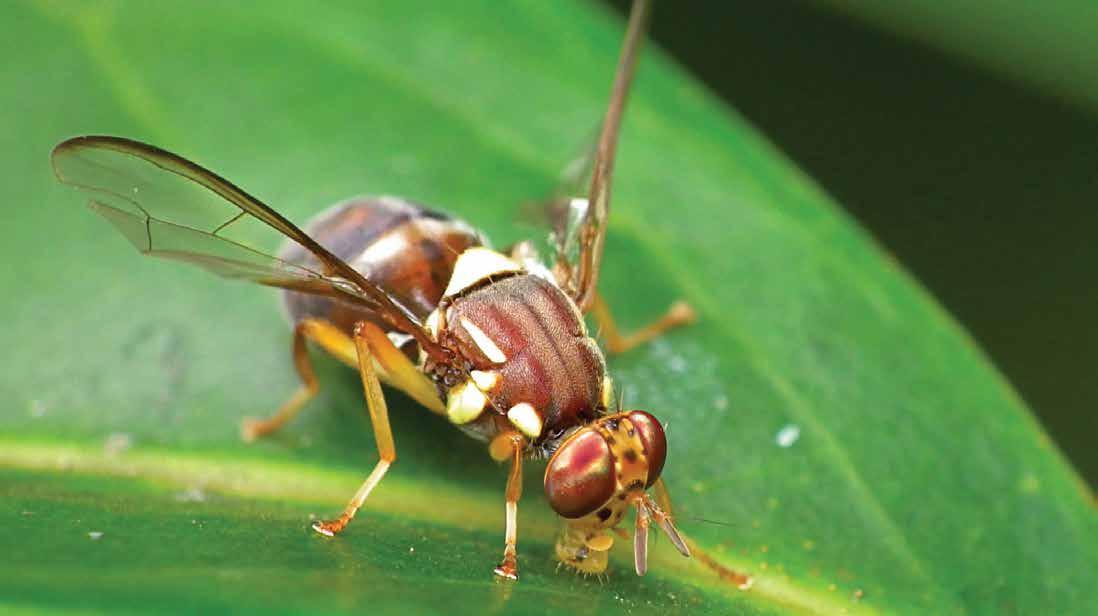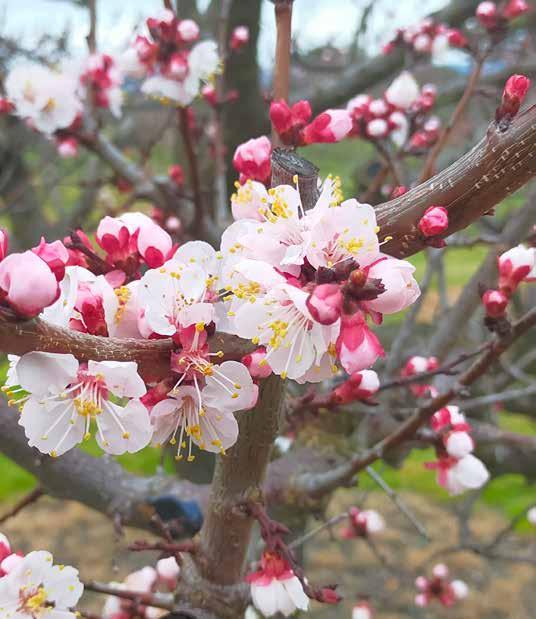
3 minute read
Fight against fruit fly strengthened
Fruit flies continue to be one of the biggest biosecurity threats facing horticulture
Fight against fruit fly strengthened through biosecurity partnership
A ground-breaking agreement to fight the threat of fruit fly has been renewed and updated by government and eight of New Zealand’s largest horticulture industry groups.
Supplied
The Fruit Fly Operational Agreement, first signed in May 2016, was the first such agreement under the Government Industry Agreement for Biosecurity Readiness and Response (GIA). The agreement sets out the operational requirements for biosecurity readiness and response, as well as cost sharing between the government and affected industries. Its renewal enhances New Zealand’s protection from the threat of fruit flies arriving and ensures that as a country we are wellprepared in the event that a response is required, as happened with the large Auckland Fruit Fly response in 2019.
Fruit Fly Council chair, Matt Dyck, says the parties are very pleased to have finalised the new agreement after a period of re-negotiation and review. “Renewing the Fruit Fly Operational Agreement illustrates the success of the partnership and will enable Biosecurity New Zealand and the horticulture sector to build on the strong foundations now in place to continue working together to manage and help reduce the impacts of fruit fly on New Zealand,” says Matt. “Fruit flies continue to be one of the biggest biosecurity threats facing horticulture. An unmanaged fruit fly
incursion would cost the horticulture industry billions of dollars, and would have significant negative impacts on the economy, the community and New Zealand’s trade relationships. By working together under GIA, government and affected industries have achieved far more than would have been possible working in isolation from each other. By harnessing the collective strengths and experiences of all the affected horticulture sectors, along with the national responsibilities of the government we have created a strong, cohesive partnership that is delivering excellent outcomes for all New Zealanders,” Matt commented. The new agreement took effect from 1 September 2022 and has a seven-year term. It sets out the outcomes sought by the parties in reducing the threat of fruit flies to New Zealand, and the roles and responsibilities of each of the signatories. The agreement provides for shared biosecurity readiness activities across all fruit fly species, covers responses and allocates cost shares for the three species of fruit fly expected to have the broadest impact should they establish in New Zealand (Queensland Fruit Fly, Mediterranean Fruit Fly and Oriental fruit fly). The agreement provides the flexibility to enable response activities to get underway rapidly if fruit flies are found, irrespective of the species and the horticultural sectors impacted. “New Zealand’s partnership between government and primary sector industries for managing biosecurity readiness and response is world leading,” Matt concluded; “the renewal of the Fruit Fly Operational Agreement confirms the commitment of all parties to working together under GIA and ensures that New Zealand is well placed to fight the threat of fruit fly.”

Signatories to the Fruit Fly Operational Agreement: Signatory Representing
Ministry for Primary Industries NZ Government Kiwifruit Vine Health Incorporated Kiwifruit, including Kiwiberry growers
NZ Apples & Pears Incorporated Pipfruit sector growing fresh pipfruit for consumption, including the nashi sector
NZ Avocado Growers’ Association Incorporated New Zealand Citrus Growers Incorporated Tomatoes New Zealand Incorporated Vegetables New Zealand Incorporated Commercial avocado growers
Fresh citrus fruit growers
Commercial fresh tomato growers Commercial fresh vegetable growers
Summerfruit New Zealand Incorporated
Commercial summerfruit growers Horticulture New Zealand Process Vegetables NZ grower members
The future of fertiliser
More yield, less disease, better shelf life. Levity Crop Science now available in New Zealand.
Dr David Marks – well published plant physiologist – has created the future of smart fertilisers.
Using knowledge of plant issues and inventing new compounds to influence mobilisation, Levity Crop Science have changed the way we look at Nitrogen and Calcium. Scan the QR codes to see how we can help your crop issue:
Lono Root development and growth partitioning, increased yield
Albina Increased Calcium uptake, better fruit retention
Sulis Colour and Brix, shelf life
Damu Boron and Molybdenum
Zeme Silicon for reducing disease and susceptibility
Indra Antioxidants reducing stress, higher resilience to salinity, drought, heat, wet
Levitycropscience.com Contact Michelle Osgood Seed & Field Services SI Ltd Ph 021330676










